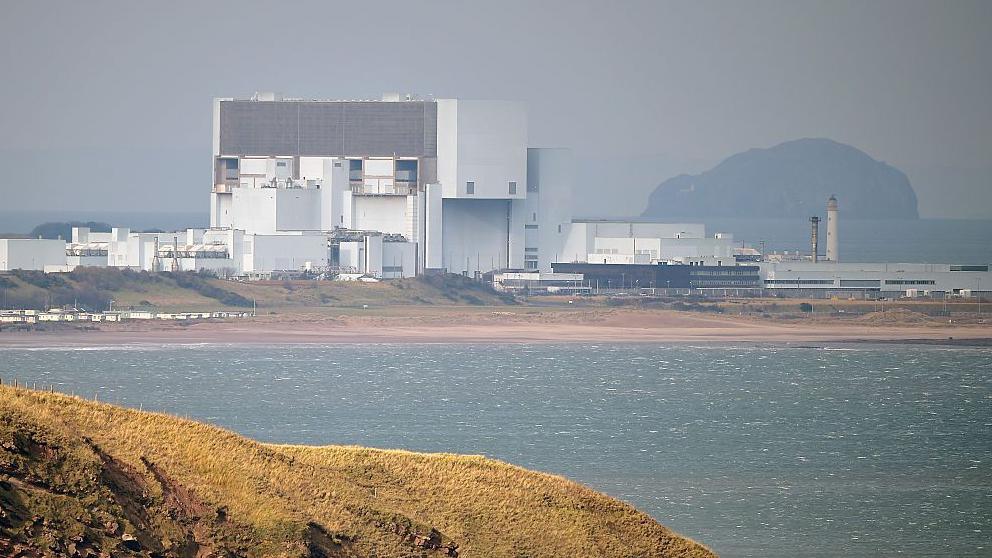Scottish Greens promise to 'turbo charge' journey to net zero
Co-leaders Patrick Harvie and Lorna Slater launched the manifesto in Edinburgh
- Published
The Scottish Greens have promised to "turbo charge" Scotland's journey to net zero with a call to invest £28bn a year in tackling climate change.
The party's manifesto says this would be paid for by higher taxes on polluting businesses and the wealthy, including a £1,000 per head tax on private jet users.
Tax breaks on oil and gas firms would be scrapped, new drilling licences banned and at least 60% of fossil fuels would be left in the ground under the party's plans.
They are also calling for an independent Scotland and the abolition of the monarchy.
Launching the manifesto, external in Edinburgh, co-leader Lorna Slater said the main parties at Westminster were deluded over the threat posed by climate change.
"There is no time left to postpone the decisive action we need to save the planet and to build a fair and green country," she said.
Ms Slater said no new oil or gas drilling licences should be granted in any circumstances, in contrast with the party's former SNP partners in government who say applications should be tested on a case by case basis for climate change compatibility.
The party would also revoke recently-granted licences.
Ms Slater added: "They are incompatible with our climate commitments. Any party, or any politician, that tells you otherwise is - I'm afraid - simply denying basic climate science."
Other proposals in the manifesto include:
A frequent flyer levy and short haul flight ban where alternative fast trains are available, subsidised rail travel and renationalising all public transport
Work towards a UK-wide road charging scheme
Nationalise the National Grid and decouple the price of electricity and gas
A progressive wealth tax on households which have more than £3.4m
Scrapping the bedroom tax, benefit cap and two child limit - and pilot schemes for a guaranteed minimum income.
A ban on new gas boilers by 2035 at the latest
Reinstate the ban on new diesel and petrol cars by 2030
Public pensions would have to divest from fossil fuels
Ms Slater said the party's Green New Deal investment programme would increase annual public investment by around £28bn - or 1% of GDP.
"With this kind of programme we can turbo-charge Scotland’s transition to net zero and build a green industrial base that will ensure quality jobs and prosperity for communities across Scotland and the UK," she said.

The Scottish Greens, which are a separate party from the Green Party in England, also called for constitutional change in their manifesto.
They want to see the Internal Market Act revoked and removal of Westminster's Section 35 powers to block Scottish legislation which is deemed to have an "adverse effect" on non-devolved matters.
These have been used to frustrate two key policies championed by the Scottish Greens before they were ejected from the Scottish government - the deposit return scheme and measures to make it easier for people to change their legal sex.
Co-leader Patrick Harvie restated his party's support for Scottish independence and rejoining the European Union
"Independence is not owned by one party," he said. "And the polls show that a growing number of independence supporters recognise that.
"Our manifesto is clear that a vote for the Scottish Greens is a vote for Scotland’s future as an independent nation"
He predicted that a rise of far right politics was "inevitable" after polling day.
"Alongside the growth of online radicalism and far-right conspiracy platforms masquerading as news outlets, this is a chilling threat to democracy," he said.
"Even if it ends up wiping them out, the truth is that the Conservative Party itself has helped to create this."

The Scottish Greens oppose plans to extend the life of the Torness nuclear power station
The manifesto says an independent Scotland would demand the removal of nuclear weapons from Faslane and Scottish waters.
The Scottish Greens are also opposed to nuclear energy, which is seen by some as an alternative to fossil fuels. The party argues it as an "outrageously expensive" distraction from renewables.
They would block new nuclear power stations being built and the renewal of Scotland's only remaining nuclear power plant at Torness in East Lothian.
The party also wants to rule out the use of hydrogen for heating, which is being piloted at a site in Fife as a possible way of cutting CO2 emissions. They believe it is better to focus on electricity in order to give clarity to consumers.
For asylum seekers the party wants all detention centres closed and institutional accommodation banned, and universal credit would be paid to those waiting for their claims to be processed.
The Scottish Greens back rejoining the EU, and want immediate recognition of an independent Palestinian state.

Green by name, green by nature. Unsurprisingly, much of the party's manifesto is devoted to policies related to tackling climate change and reaching net zero.
The tension between protecting Scottish jobs in the oil and gas sector and the need for climate action can tie others in knots. Not so for the Greens, who are unapologetic when it comes to getting tough on the industry.
The party is also taking aim at the country's richest - with proposals for sweeping changes to taxation, aimed at "redistributing wealth" and staking a claim on left-wing ground.
There were jabs at Labour – who the Greens say will fail to deliver investment in public services.
And with their backing for independence, the party is pitching to SNP supporters too.
Historically the Scottish Greens have failed to make an impact in general elections - the first-past-the-post system has squeezed them out.
They're standing a record 44 candidates in this contest, and will be hopeful that their recent stint in government at Holyrood will have raised their profile among the voting public.


